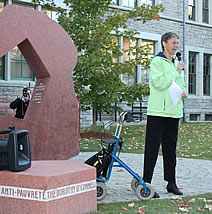Act Now

Empower U: Learn to Access Your Disability Rights Training on Canadian Human Rights, the Convention on the Rights of Persons with Disabilities (CRPD) and its Optional Protocol (OP) training aims to increase awareness of how to address discrimination using more familiar Canadian human rights laws such as Human Rights Codes and the newer international Convention on the Rights of Persons with Disabilities (CRPD). This is training for persons with disabilities by persons with disabilities. The training is part of a project funded by Employment and Social Development Canada and implemented by the Council of Canadians with Disabilities (CCD) in collaboration with Canadian Multicultural Disability Centre Inc. (CMDCI), Citizens With Disabilities – Ontario (CWDO), Manitoba League of Persons with Disabilities (MLPD) and National Educational Association of Disabled Students (NEADS). Read more.
Sign Up for our monthly digest
A monthly newsletter from CCD about what is happening in the community
What Are Canada's Political Parties Plans Concerning Inclusive Emergency Preparedness?
Related Documents
September 15, 2021
CCD Seeking an Accessible and Inclusive Post-COVID-19 World: No New Barriers!
September 13, 2021
CCD Seeks Commitments on Accessible and Affordable Housing
September 9, 2021
CCD Seeks from Parties Disability-Inclusive Climate Action and Emergency Preparedness Plans
For Immediate Release | September 17, 2021
The past months have made the importance of inclusive emergency preparedness abundantly clear to people with disabilities living in Canada. Emergency management is a core responsibility of the Government of Canada and a collective responsibility of all Federal Government institutions. The Council of Canadians with Disabilities (CCD), a national non-partisan human rights organization seeking an accessible and inclusive Canada, is calling upon all Federal Parties to share their plans for ensuring that people with disabilities are not forgotten during the planning processes for future emergencies or left out when disasters occur. “We all remember how the Canadian military had to be deployed to nursing homes, where people with disabilities were dying without adequate care because the service system was unprepared to meet the demands of COVID-19. We need to learn from the tragedies of the pandemic and ensure that people with disabilities are not forgotten as we plan for future emergencies,” states Heather Walkus, CCD 1st Vice Chair.
Some key components of emergency preparedness plans are: evacuation, transportation, communication and shelter. In previous emergencies, barriers have occurred in all these areas. For example, at the beginning of the pandemic ASL/LSQ was not included in all messaging concerning COVID-19.
CCD reminds the Federal Parties that the Accessible Canada Act (ACA) calls for the removal of existing barriers and prevention of new barriers in the following areas: employment, the built environment, information and communication technologies, communication, other than information and communication technologies, the procurement of goods, services and facilities, the design and delivery of programs and services, transportation and that American Sign Language, Quebec Sign Language and Indigenous sign languages are recognized as the primary languages for communication by deaf persons in Canada. “CCD is seeking to learn from the Federal Parties how, if elected to form the Government of Canada, they would ensure that Canada’s emergency preparedness activities contribute to the goal of a barrier-free Canada as set out in the ACA,” states Jewelles Smith, CCD Communications and Government Relations Coordinator.
-30-
For More Information Contact:
Jewelles Smith, Communications and Government Relations Coordinator, jewelles@ccdonline.ca
Heather Walkus, 1st Vice Chair, heather@ccdonline.ca
About CCD
CCD is a non-partisan, national human rights organization of people with disabilities working for an inclusive and accessible Canada.
Mission
The Council of Canadians with Disabilities (CCD) is a social justice organization of people with all disabilities that champions the voices of people with disabilities, advocating an inclusive and accessible Canada, where people with disabilities have full realization of their human rights, as described in the UN Convention on the Rights of Persons with Disabilities.
Mandate
The Council of Canadians with Disabilities (CCD) unites advocacy organizations of people with disabilities to defend and extend human rights for persons with disabilities through public education, advocacy, intervention in litigation, research, consultation and partnerships. CCD amplifies the expertise of our partners by acting as a convening body and consensus builder.

Marie White, a former Chairperson of CCD, addresses anti-poverty rally.
